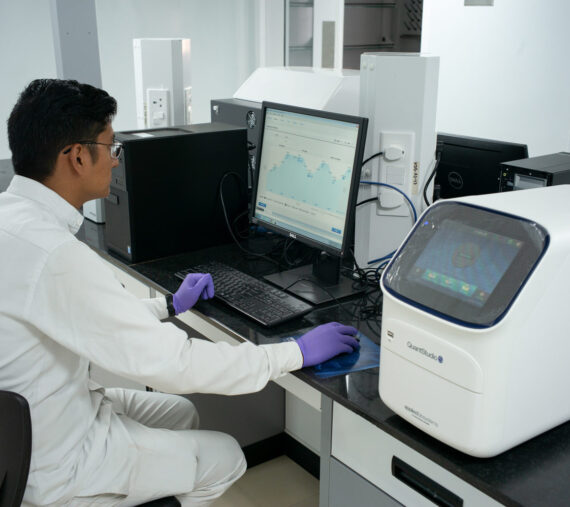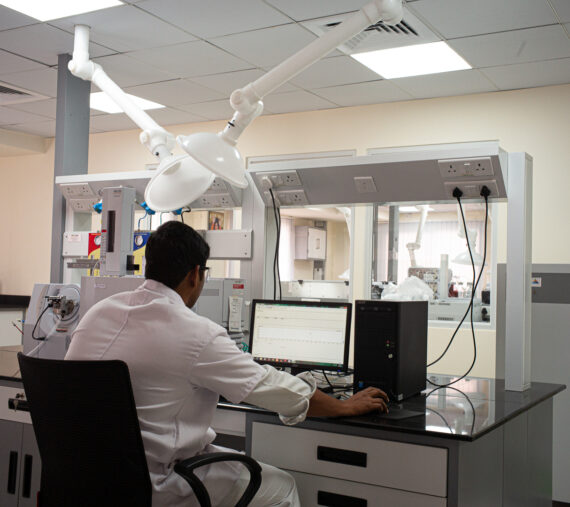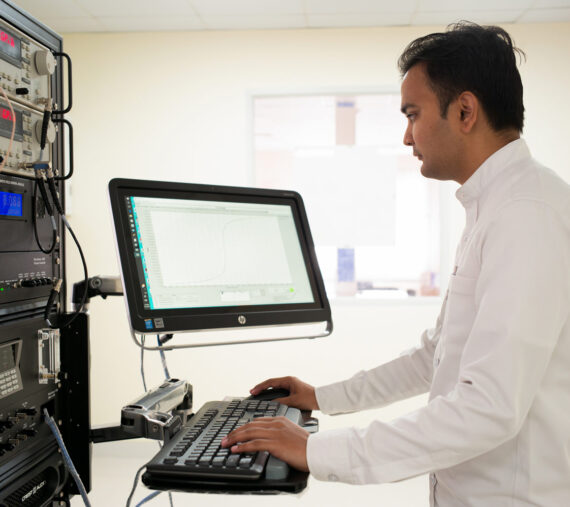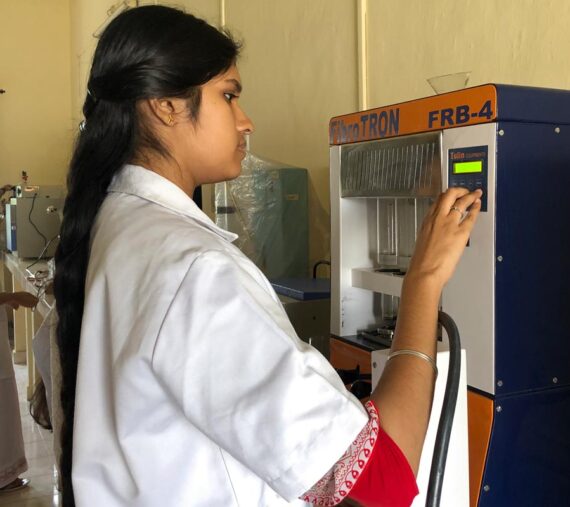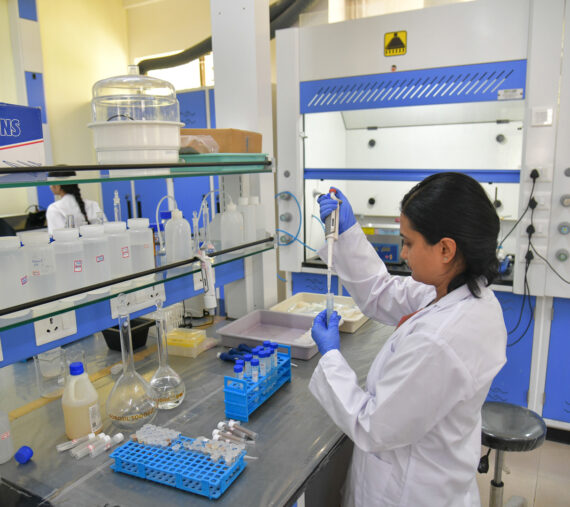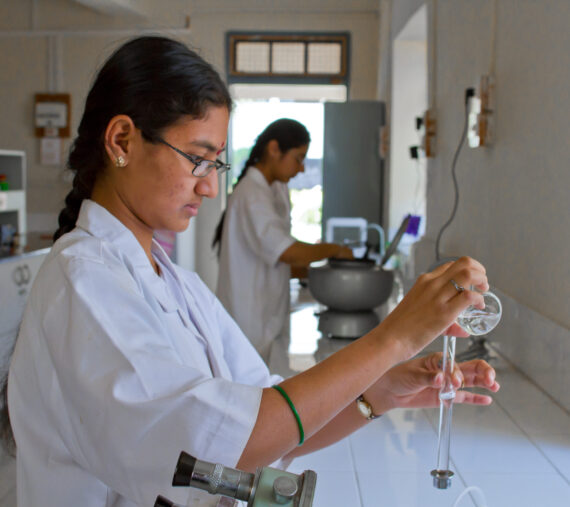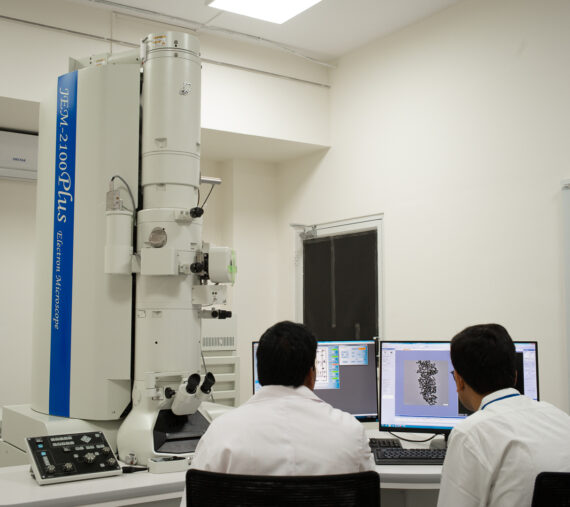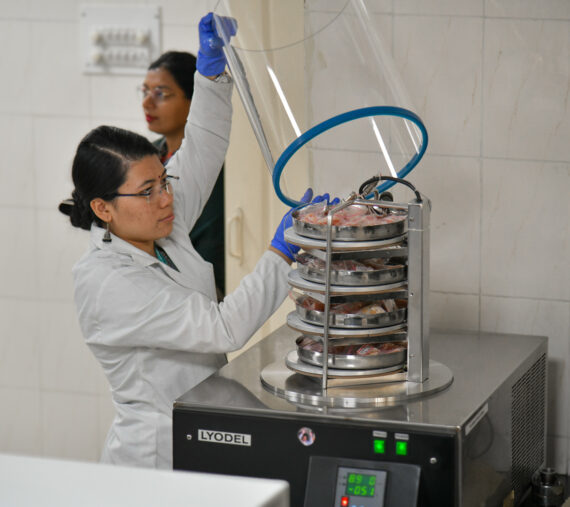Doctoral Research Programmes
For Women and Men
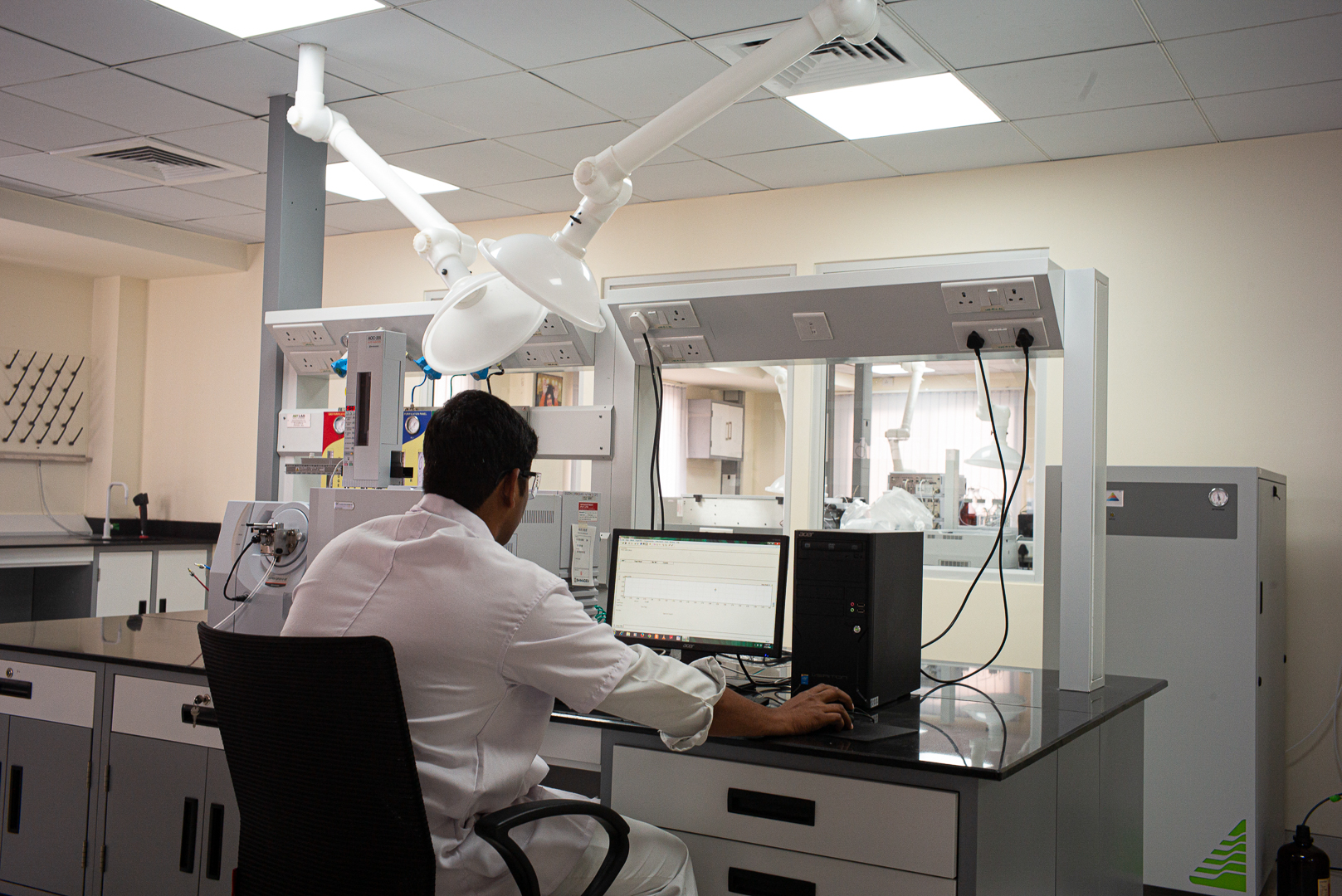
Duration: 6 Years
The degree of Doctor of Philosophy (Ph.D.) at SSSIHL is intellectually demanding and students must have a high level of attainment and motivation to pursue this programme of advanced study and research. Admissions to the SSSIHL Doctoral Research programme is currently available across nine of the University’s departments. First, see the Eligibility tab on this page for detailed information on admissions eligibility criteria. Then, visit the Research Areas tab to see the topics and areas of research available per department.
After you have decided on the Research Areas you want to apply for, go to the SSSIHL Admissions Application Guide. This page will give you step-by-step guidance on how to successfully apply for the Doctoral Research programme at SSSIHL, including a full overview of what it is like to do research at SSSIHL.
Once you submit your online application, you cannot change it. Therefore, it is very important that you go through the Application Guide and read the important information it provides on various aspects of the application, such as Registering for Online applications, what documents to upload, and what happens at each stage of the application process.
SSSIHL has a rolling admissions policy for its Doctoral Research Programme. This means that admissions to a Ph.D. programme is open throughout the academic year. Applicants can apply at any point of time without a set application deadline.
However, this strictly applies only to those applicants who are eligible for a direct interview (see below). For all other applicants – who must appear for the Admissions Test – the Admissions cycle will take place twice a year (each semester). Kindly visit our Admissions Dates & Deadlines page for these dates.
SSSIHL IS UNIQUE
As detailed in the About Us section of our website, SSSIHL is unique in several ways.
In addition to the Sri Sathya Sai Values-based Integral Education practiced at SSSIHL, one of the salient features is that, aligned with the vision of Bhagawan Sri Sathya Sai Baba, education at SSSIHL is provided FREE to all students for all programmes of study.
This commitment aims to eliminate financial barriers and promote access to quality education for all deserving candidates, fostering an inclusive learning environment. SSSIHL does not levy any of the following fees:
- Tuition fees
- Admissions fees
- Infrastructure & Development fees
- Library fees
- Examination fees
- Basic amenities fees
- Sports fees
- Medical fees*
*students have access to free medical treatment at Sri Sathya Sai General and Sri Sathya Sai Super Speciality Hospitals located at Prasanthi Nilayam and Whitefield, Bangalore
Hostel fees: Boarding and lodging charges will be communicated to selected candidates
All applicants must meet the following eligibility criteria to qualify for admissions to the Ph.D. programme and appear for the SSSIHL Admissions Interview.
GENERAL
Sri Sathya Sai Institute of Higher Learning (Deemed to be University) has a merit-based Admissions Policy open for all.
The following criteria apply to all applicants of the SSSIHL Doctoral Research Programme:
- Age: Below 30 years of age on the date of application to the programme.
- Compulsory Hostel stay: Given the unique modern Gurukula system of Values-based Integral Education at SSSIHL, it is mandatory that all students study and reside at gender-specific campuses during their entire period of study.
Candidates who do not meet all the admissions criteria listed for the programme they apply to will not be eligible for admissions.
Relaxation of Age
A relaxation of up to 5 years is provided to Women applicants and candidates belonging to SC/ST/OBC-NCL/PwD (Divyangjan)/EWS.
ACADEMIC
To qualify for an SSSIHL Doctoral Research Programme, applicants must meet at least one of the following three criteria:
NATIONAL-LEVEL EXAMINATION
Candidates who have qualified in either one of the following:
- UGC-NET (Category 1, 2 or 3)
- Joint CSIR-UGC NET (Category 1, 2 or 3)
- GATE
- JEST
POSTGRADUATE DEGREE
Candidates who hold either one of the following:
- A 2-year/4-semester Master’s degree (following a 3-year undergraduate programme)
- A 1-year/2-semester Master’s degree (following a 4-year NEP [Hons. with Research] undergraduate programme)
The Master’s degree can be from SSSIHL or any other recognized university, in a relevant discipline within the faculties of Science, Engineering, Management & Commerce, Humanities & Social Sciences (including subjects like Economics, Education, Languages & Literature) etc., with a minimum of 55% marks (aggregate) or its grade equivalent.
UNDERGRADUATE DEGREE
Candidates who hold a 4-year/8-semester NEP Bachelor’s degree (Hons with Research) from SSSIHL or any other recognized university in the respective discipline, with a minimum CGPA of 7.5/10 or its equivalent percentage of marks.
Candidates submitting their GATE / JEST scores will be assessed by the respective Department of the Institute, and those found eligible need not take the admission test of the institute and they will be considered for the Interview based on their performance in the evaluation test in English and a Subject Viva.
Relaxation of Marks
Candidates belonging to the following categories shall be provided a relaxation of 5% marks as per prevalent UGC guidelines:
- Scheduled Castes (SC) / Scheduled Tribes (ST)
- Other Backward Classes (OBC) – Non-Creamy Layer (NCL)
- Persons with Disabilities (PwD) / Divyangjan
- Economically Weaker Sections (EWS)
ADMISSIONS TEST
Candidates Eligible for a Direct Interview
Candidates who have qualified in either of the National-level Examinations – UGC-NET (Category 1, 2 or 3) | Joint CSIR-UGC NET (Category 1, 2 or 3) | GATE | JEST – need not take the SSSIHL Research Aptitude Assessment Test and will be considered directly for the Interview.
Candidates who must appear for the Admissions Test
All other candidates who have not qualified in one or more of the above National Examinations but meet the minimum eligibility criteria for the Doctoral Research programme, will be required to take the SSSIHL Research Aptitude Assessment Test, and, if shortlisted, the interview to the Ph.D. programme.
Kindly see the Research Areas tab to view detailed information on the departments that offer a Ph.D., and the current areas of research available for admissions.
Each department at SSSIHL has a unique set of research areas for both women and men campuses.
Note: Given the unique modern Gurukula system of Values-based Integral Education at SSSIHL, it is mandatory that all students study and reside at gender-specific campuses during their entire period of study. Accordingly, admissions (to all programmes) are campus-specific.
The Ph.D. programme is open for the following departments at SSSIHL:
MATHEMATICS & COMPUTER SCIENCE
WOMEN'S CAMPUS
MATHEMATICS
Differential Equations
Applications of Partial Differential Equations in Medical Imaging
Fluid Dynamics
Fluid flow, heat and mass transfer
CFD Applications in biomechanics: Blood flow in arteries
COMPUTER SCIENCE
Cryptography and Information Security
Design of efficient cryptographic primitives for secure communication, authentication, and data protection in modern systems
Encryption and Access Control in Cloud Environments
MEN'S CAMPUS
MATHEMATICS
Graph Theory
Hash algorithms and labelled graphs
Multistep authentication and labelled graphs
Soft sets and labelled graph, AI techniques for clinical coding
Metric Dimension of graphs
Ecological & Infectious Disease Modeling
Stochastic modeling of prey-predator systems, multi-scale disease dynamics, and data-driven analysis
Fractal Interpolation & Approximation
Graph-directed and recurrent fractal interpolation, 2D/3D fractal modeling
Fractal Applications
Fractal solutions in PDEs, image compression, and wavelet-based signal analysis
Fractal techniques in fingerprints, seismic analysis, and signal reconstruction
Hyperbolic Equations and Pseudodifferential Operators with Applications
Study of Hyperbolic Partial Differential Equations and their applications to Rocket Launching Ignition Overpressure
COMPUTER SCIENCE
Deep Learning
Class Incremental Learning
Deep Learning in the Long Tail: Where the Rare Matters
To optimize livestock management, aiming to improve animal health, welfare, and productivity while minimizing environmental impact.
Multimodal generative AI for healthcare and education using video, audio, image, and text
Patient-specific cardiac simulations via graph neural networks
Machine Learning and AI
Use of Artificial Intelligence-based techniques for the retrieval of Atmospheric motion Winds
Real-life human behaviour understanding using facial, audio, and textual cues
AI-based early detection and optimization in healthcare protocols
AI for early autism detection and preventive care in pediatric healthcare
Predictive analytics and system modeling for optimizing social security schemes
AI-based early detection and optimization in healthcare protocols
Optimizing the placement of ARGO floats in the Indian Ocean
Generative AI and LLMs
Extracting semantically closer multimodal data from Sathya Sai Sahitya
Decentralized AI, Collaborative Learning, Privacy-preserving Learning
Schema-Aligned Instruction Tuning for LLMs in Emergency Care
Privacy-Preserving AI Techniques
Machine Learning on Encrypted Data, Privacy-preserving Data Analytics, Privacy-aware AI
Distributed Databases
Query Processing and Optimization in Distributed Databases hosted on the Cloud
Cyber Security
AI in Cyber Security
Diffusion models for watermarking
Quantum Computing
Efficient Solutions to Computationally Hard Problems
ACTUARIAL SCIENCE
Impact of Climate Change on Insurance Pricing and Reserving
Motor Third Party Insurance – Pricing and Reserving
Application of Gen AI in Cyber and Property Insurance: Risk Assessment and Claims
Centre of Excellence in Actuarial Data Science (CADS) broad Research Areas
Metaverse Risk Management Products - Pricing, Reserving & Supervision
Electric Vehicle - Loss Curves and Residual Value
Cyber Risk - Affirmative and Non-affirmative - Product Design and Pricing
ESG Climate Change Impact & Risk Quantification Modelling
Data-driven Fraud Detection in Insurance
Blockchain and Cryptocurrency Insurance - Use cases
IFRS 17 Implementation for Insurance Companies
Building models for Crop-Revenue protection
Models using AI & ML for a Hybrid Educational System
Models for Mortality, Morbidity, Longevity, etc.
Enterprise Risk Management Modelling
Risk-based Capital Requirements Modelling
Generative AI applications in Insurance
Models for measuring the efficiency of Insurance Organizations using KPIs
Quantitative Models for Risk Management in Microfinance Institutions
POST-DOCTORAL FELLOWSHIP
Healthcare applications using AI/ML, DL and Infectious Disease Modeling
Atmospheric Motion Estimation from Satellite Images
Study of Left Ventricular Geometry from 3D MRI Cardiac Images
Human behaviour analysis using Multimodal vision-language models
Creating Large Language Models for Sai Literature (Telugu & English)
Development of an autism behaviour model using multimodal LLMs
An end-to-end design and development of an outcome-based data science curriculum on the web
Relevant Educational Video Retrieval from large video databases for Math and Science based on NCERT school curriculum
Conversational Interfaces for Structured Medical Data and Framework for Conversational Sensitivity in Clinical Decision Support
Microlocal analysis and application to control of waves
PHYSICS
WOMEN'S CAMPUS
Materials Science
Development of biomaterials for dental, bone implants and other biomedical applications
Design and Characterization of Multifunctional Composite Materials for Electromagnetic and Energy Applications
Novel Materials for Solar Cells and Biomedical Applications
Synthesis and Device Applications of Novel Ferroelectric Materials for Solar Energy Harvesting and Biomedical Technologies
Nuclear Physics
Nuclear Structure Studies Using Gamma-Ray Spectroscopy
Engineering Advanced Nanomaterials for Environmental Remediation
Multifunctional Nanomaterials for Water Purification via Adsorptive Contaminant Removal
Electrochemical Sensing of Water Contaminants Using Functionalized Nanomaterials
MEN'S CAMPUS
Hybrid Materials for Biomedical Applications
Understanding the complex flow behaviour of soft condensed matter systems through rheological and dielectric studies
Computational Biophysics
Single Molecule Detection (DNA / Protein Sequencing) using Synthetic / Biological Nanopores
Role of Polymer Branching in Determining Ionic Conductivity of Electrolytes.
Medical Imaging
Design and Characterization of Compact Gamma Imaging Systems for Nuclear Medical Physics
Applied Optics and Spectroscopy
Designing and developing low-cost Optical Imaging solutions
Developing Chemometric tools for Biomedical applications using Raman and Fluorescence spectroscopy
Experimental and Computational investigation of Structure-Property correlation of Functional Organic and Inorganic materials using Raman spectroscopy
Nonlinear Optical Spectroscopy
Developing novel Nonlinear optical materials for Photonics and Integrated Optics applications
Functional Optical Materials
Developing Functional Glass Ceramics for Electro-optic and Ferroelectric applications
Nuclear Spectroscopy
Nuclear Structure Studies Using Electron-Gamma Spectroscopy
Radiation Shielding Materials
Development of a Novel Pb-free, Gamma-ray Shielding materials
Functional Materials for Electronics Applications
Design Novel electroceramics for capacitor - varistor applications
Design & Development of Radiation Resistant & High Temperature Sensor for
Gas Pressure Monitoring in Reactors
Energy Materials
Development of Solid Electrolytes for High-Performance Lithium/ Sodium-Ion Batteries
Fabrication and Characterization of Lead-Free Piezoelectric Ceramics for Energy Harvesting Applications
Optical Networks (AI / ML)
Optimization and QoT estimations in Optical Networks using AI/ML
CHEMISTRY
WOMEN'S CAMPUS
Computational Chemistry
Adsorption Desalination: Natural, semi-synthetic and synthetic polymers as adsorbents in desalination and water purification; Sustainable and eco-friendly alternatives
Hydrogen Storage Materials: Natural amino acids as potential hydrogen carriers; Functionalized ionic liquids for improved storage capacity; Ionic liquid-functionalized graphene for hydrogen storage
Computational Design of Sustainable Binders: To enhance nanomaterial interactions and optimize binder properties for improved battery performance
Materials Science | Environmental Chemistry
Development of Water Filters for Domestic Applications: Designing innovative mesoporous PVA–metal ion hydrogel beads capable of simultaneously removing arsenate, chromate, and fluoride from drinking water for fast adsorption kinetics and excellent reusability, making them ideal for sustainable water purification systems.
Fixed-Bed Column Design for Broad-Spectrum Contaminant Removal: Designing fixed-bed column filters using GO–PVA–PEI hydrogel beads capable of removing both cationic and anionic contaminants from water, enhancing efficiency in water treatment applications.
Next-Generation Functional Hydrogels: The synthesis of highly porous hydrogels integrated with nanomaterials, specifically designed for applications in drug delivery, biosensor integration, and catalysis.
Materials Science | Nanomaterials and Nanotechnology
Nanomaterials and Biomaterials for Environmental Remediation, Biodegradable Drug Delivery, and Strategic Sensing Applications
Green synthesis of nanomaterials with a focus on reducing toxicity, enhancing biocompatibility, and evaluating sustainability through lifecycle analysis.
Design and development of stimuli-responsive smart nanocarriers for targeted drug release, enabling site-specific delivery and co-delivery of therapeutic agents for synergistic treatment outcomes.
Development of responsive sensor materials integrated with multi-analyte detection platforms and multi-modal signal processing for real-time environmental monitoring.
Development of multifunctional nanocomposites for efficient removal of heavy metals and organic pollutants from water and soil, emphasizing reusability, photocatalytic activity, and magnetic separability for sustainable environmental remediation.
Development of fluorescent nanomaterials with tunable optical properties for multi-color imaging and advanced anti-counterfeiting applications.
Materials Science | Polymer Chemistry
Design and development of stimuli-responsive polymers (e.g., light, pH, temperature), Smart coatings for corrosion resistance and antifouling applications, Synthesis and characterization of CAN and DCPN based reversible thermosets.
Sustainable and green synthesis of polymers from renewable resources and polymer nanocomposites for enhanced mechanical, thermal, and barrier properties.
Polymers for biomedical applications: drug delivery, tissue engineering etc., hyperbranched and dendritic polymers for advanced functional materials.
Flame-retardant polymer systems using halogen-free additives, 3D printing and additive manufacturing using functional polymers.
Recycling and upcycling of polymer waste.
MEN'S CAMPUS
Spectroscopy, Materials Science, Computational Chemistry, Health
Designing Novel Materials for Applications in Solar Cells - A Computational, Synthetic and Spectroscopic study.
Design of Novel Molecules with Anti-Kasha Behaviour for OLED and Bioimaging Applications.
Understanding Polymer-Plasticizer Interactions Through Coarse-Grained Molecular Dynamics Simulations and Using it in the Design of Materials for Next Generation Biomedical Devices.
Understanding the Causes for the Onset of Diabetes in Youthful and Fit Individuals.
Design and development of novel topological materials for various optoelectronic applications.
Organic and Medicinal Chemistry, Natural Products
Design, Synthesis, characterization and evaluation of novel arjunolic acid derivatives as potential cardiovascular agents.
Design, Synthesis, characterization and evaluation of novel heterocyclic compounds as potential AChE inhibitors for neurodegenerative diseases.
Design, synthesis, semi-synthesis of natural products and their analogs with potential biological activity.
Synthesis, characterization and applications of Novel Materials for use in OLEDs.
Plasmonics and Materials Science
Development of Novel omics platform based on plasmonics.
Development of plasmonic coatings for industrial and space applications.
Energy Materials and Electrochemistry
Design of atomically defective inorganic perovskite-type nanomaterials for energy storage and electrocatalysis.
Design of functionalized hierarchical carbonaceous nanocomposites for hybrid supercapacitors.
Sustainable and zero waste approach for synthesis of functionalized carbonaceous nanomaterials from biomass wastes for high-performance supercapacitors.
Electrodeposited patterned nanomaterials for batteries and supercapacitors.
Nanomaterials for Environment, Health and Analytical Applications
Engineering Hierarchically Porous Inorganic Nanosponges with Tunable Surface Functionalities for Multi-Pollutant Remediation
The synthesis of novel inorganic nanosponges with precisely engineered hierarchical porosity (combining micro-, meso-, and macropores) and tunable surface functionalities for the simultaneous and efficient removal of a broad spectrum of pollutants from water and air. This goes beyond single-pollutant removal and addresses the complex nature of environmental contamination.
Bio-Inspired Metal Complex-Nanomaterial Hybrids for Active Targeting and Controlled Release in Precision Medicine
Design and synthesise novel hybrid nanomaterials where metal complexes with inherent therapeutic or diagnostic properties are integrated with bio-inspired or biomimetic nanocarriers. The goal is to create advanced drug delivery systems with enhanced active targeting capabilities, stimuli-responsive controlled release mechanisms triggered by the specific disease microenvironment, and improved biocompatibility for precision medicine applications.
Dynamic and Self-Reporting Nanomaterial-Based Sensors for Real-Time, In Situ Quantification of Toxic Metal Ion Mixtures in Complex Matrices
Focus on developing novel functionalized nanomaterials that exhibit dynamic responses and self-reporting capabilities for the highly selective, sensitive, and real-time quantification of multiple toxic metal ions in complex environmental and biological matrices. This goes beyond traditional single-analyte detection and addresses the challenges of simultaneous detection and quantification in realistic scenarios.
Bioorganic and Medicinal Chemistry
Design and synthesis of small molecules or natural products for biological activities. Also, explore fields of drug repurposing and alternative drug discovery methods.
Bioinorganic Materials
Synthesis, characterization of Bio-Glass material that mimics human bone. To perform in vitro experiments to understand in vivo viability.
Artificial Intelligence / Machine Learning (AL/ML)
Designing Novel Materials for Applications in Solar Cells using Artificial Intelligence/ Machine Learning (AL/ML) Techniques.
BIOSCIENCES
WOMEN'S CAMPUS
Phosphodiesterase Biology
Phosphodiesterases (PDE) are the enzymes that hydrolyze cyclic nucleotides into nucleotide monophosphates. Several PDE inhibitors are popularly used to treat patients suffering from different ailments. However, certain PDE inhibitors were known to cause severe side effects, such as hearing loss. The physiological effects of various PDE5 inhibitors, like Sildenafil, Avanafil, Mirodenafil and Lodenafil, on cell signalling will be studied. The mechanism by which PDE5 inhibitors cause side effects will be investigated.
Uncovering the Role of Novel Meristematic Genes in Tomato Pedicel Abscission Zone Formation and Regulation
The abscission zone (AZ) is a specialized region in plants where organs such as flowers, leaves, or fruits are shed. This PhD project aims to identify and characterize novel meristematic genes that regulate the formation and activation of the tomato pedicel abscission zone using a combination of genetic, molecular, and imaging approaches. The successful candidate will gain expertise in plant developmental biology, gene regulatory networks, and advanced molecular techniques, contributing to both fundamental knowledge and potential agricultural applications in fruit retention and crop improvement.
Cardiovascular Complications in Diabetes
Diabetes mellitus is a chronic metabolic disorder that significantly contributes to cardiovascular disease (CVD). The cardiovascular complications, such as atherosclerosis, myocardial infarction, stroke, and heart failure, are a significant cause of morbidity and mortality in diabetic patients. Our research aims to explore the underlying pathophysiological mechanisms driving vascular complications in diabetes, focusing on chronic inflammation, endothelial dysfunction, oxidative stress, and advanced glycation end products (AGEs). This study also aims to identify novel therapeutic biomarkers for early diagnosis, risk prediction, and targeted intervention.
MEN'S CAMPUS
Peptidomics Approach Towards the Discovery of Next-Generation Therapeutic Peptides
Peptides are gaining attention as next-generation therapeutics, with drugs like Ozempic and Mounjaro demonstrating clinical success. This project aims to discover novel peptides targeting global health challenges such as antimicrobial resistance, cancer, and diabetes. Using in silico methods, peptides will be mined from genomic/proteomic databases and evaluated via molecular docking and dynamics. In vitro work includes peptide isolation, purification, and characterization, followed by bioactivity screening using bacterial and mammalian cell assays. The candidate will gain interdisciplinary skills in computational biology, biochemistry, and cell-based assays to contribute to cutting-edge peptide therapeutic development.
Type-3 Copper Enzymes for Biotechnological Applications
Type-3 copper enzymes, such as phenoloxidases, show strong potential in biotransformation and biosensor technologies. Sourced from mushrooms and marine organisms, these enzymes offer unique functional properties. This Ph.D. project will involve their isolation, purification, and detailed structural and functional characterization using biochemical, biophysical, and in silico methods, including structural modelling, molecular docking and dynamics simulations. The candidate will gain interdisciplinary expertise in enzyme technology, computational biology, and bioanalytical techniques, contributing to the development of novel biotechnological tools.
Antibiotic Persistence
Studying the genetic and/or transcriptomic basis of bacterial persistence as a potential mechanism for survival under antibiotic pressure.
Antibiotic Co-resistance in ESKAPE pathogens
Exploring the core resistance and collateral sensitivity among ESKAPE pathogens to design improved AMR detection tools and develop optimised treatment protocols.
Neurodegenerative Diseases, Bone and Joint Diseases
Integrated clinical, omic analysis and model system-based mechanistic studies on Taupathis. Clinical and Multiomic studies for biomarker discovery and therapeutic intervention in Avascular necrosis of the femoral head.
FOOD & NUTRITIONAL SCIENCES
WOMEN'S CAMPUS
Functional Foods and Nutraceuticals
Improving muscle health through plant-based protein alternatives
Sustainable Plant-based Biomaterials for Improving Health and Food Packaging System
Utilization of plant-based biomaterials for enhancing health and packaging systems
Food Processing and Agro Waste Valorisation
Utilization of bioactive components from food processing waste to enhance food stability and develop value-added products
Valorisation of food processing waste in developing biodegradable packaging films for food applications
Food Safety and Quality
Application of AI in food safety and quality monitoring
Food Processing Technologies
Investigating the impact of thermal/nonthermal food processing technologies on the quality and safety of organic fresh produce through a life cycle analysis assessment approach
Dairy Science and Technology
Technological advancements and quality characterization of plant-based dairy analogues
Clinical and Functional Nutrition
Nutritional Strategies for the Prevention and Management of Metabolic dysfunction-Associated Steatotic Liver Disease (MASLD) in Indian Adults: Exploring the Role of Traditional Diets, Micronutrients, and Gut Microbiota
Public Health and Community Nutrition
A Multidimensional Approach to Addressing Iron Deficiency Anaemia in Indian Women, Adolescents and Children: Integrating Gut Microbiome, Bioavailable Iron-Rich Foods, and Region-Specific Dietary Practices
Nutritional interventions for T2D management
Nutritional Biology in Diabetes
Evaluation of preventive epigenetic effects of functional & ayurvedic foods in T2D
Impact of gluten-free plant-based diets and gut-friendly nutrition interventions on the metabolomic signatures and biomarkers in Type 2 diabetes
Food Fortification & Micronutrient Malnutrition / Gut Nutrition
Biofortification of sprouts and microgreens and their evaluation for nutritional and therapeutic benefits
Evaluation of RUSF was developed using bioprocessed-based fortified cereals/millets and gut microbiome modulating ingredients to address iron and zinc deficiency in MAM children and adolescents.
Ayurvedic Nutrition
Evaluation of ayurvedic nutritional products for addressing micronutrient malnutrition with special reference to anaemia.
Nutrition Education
Diabetes self-management education and culinary skill training in Type 1 and Type 2 diabetes - Impact on diabetes biomarkers.
MANAGEMENT & COMMERCE
WOMEN'S CAMPUS
Exploring different paradigms of quality in Higher Education
Leadership and Organizational Behaviour through the lens of Sri Sathya Sai Philosophy.
Exploring 'Educare' in the educational mission of Sri Sathya Sai Baba.
Healing HRM through Positive Psychology
Effect of Organizational Culture on high-performance organizations in India - Development of Organizational Culture Assessment Scale
Organisation Change and Development
Sustainable Human Resource Management
Mindfulness and Mental Health
Learning Organizations.
Financial inclusion
ESG reporting and sustainable finance
Sustainable consumption
Luxury consumption
Metaverse
Brand Recall and Marketing Strategy
Entrepreneurship and Innovation
Organisation Behaviour: Leadership and Motivation Factors
Rural development
MEN'S CAMPUS
Digital Financial Services and their Role in Promoting Sustainable Rural Entrepreneurship
Leading for Sustainability: A Grounded Theory Exploration of Leadership Practices among Sustainable Business Leaders.
Leadership and the Institutionalization of Sustainability: A Multi-Sectoral Study of Strategy, Culture, and Impact
Organizational Resilience - scale development and validation using a mixed methods study of select organizations.
Organizational Transformation: how agile organizations achieve this through values-based leadership.
Sustainable City planning, Urban Mobility Solutions, Clean technologies in manufacturing and services, Social Entrepreneurship and Bottom-of-Pyramid Markets
Business Responsibility, Sustainability, Role of AI and Tech in Sustainable Business and ESG
Consumer Trust in AI-Driven E-Commerce Platforms
Green Marketing Strategies and Their Effectiveness on Gen Z Purchasing Behaviour
HUMANITIES & SOCIAL SCIENCES
WOMEN'S CAMPUS
Women Empowerment
Women Empowerment for Sustainable Economic Development.
Macroeconometric Modelling of the Indian Economy
Econometric Modelling of various aggregates of the Indian economy under the New Economic Policy Regime
MEN'S CAMPUS
Health Economics
Rural Health Care Delivery System
Health inequalities in South Asian countries
Behavioural Economics
Role of Behavioural Economics in Government Policy Framework
Public Finance and Fiscal Policy
Role of Fiscal policy in growth
Economics of Education
Role of Education: A study on Sri Sathya Sai Integral System of Education.
Macroeconometric Modelling of the Indian Economy
Econometric Modelling of various aggregates of the Indian economy under the New Economic Policy Regime
Financial Economics
Analyzing Exchange Rate Volatility and Cross-Border Capital Flows Using Econometric, Machine Learning, and Deep Learning Approaches
Development Economics
Household Economic Wellbeing, Child Health and Poverty in India: Findings from NFHS data
Energy Economics
Multidimensional Energy Poverty
Comparative Politics, Political Theory, International Politics & Foreign Policy, Public Policy
New World Order, Global Justice, Comparative Political Theory, Comparative analysis of world constitution (case study of secularism)
EDUCATION
WOMEN'S CAMPUS
Technology Integration in Instruction
Innovative Instructional Approaches
Holistic Education for Human Transformation: Sri Sathya Sai Integral Education and NEP 2020
Integration of IKS in the Digital Classroom
NEP-Aligned Assessment Strategies
Sustainable Education for a Sustainable Future
Digital Media and Psychological Perspectives
LANGUAGES & LITERATURE
WOMEN'S CAMPUS
ENGLISH
Gender and Feminist Studies
Cultural Studies
Medical Humanities
Children's Literature
Drama
Indian Mythological Fiction
European Classics
Cultural Studies
Film Studies
Multispecies Graphic Novels and Comics Studies
Translation Studies
Narratology
Ecopoetry
Theory and Philosophy
English Literature and Its Intellectual Traditions
Modern/Post Modern Poetry
Applied Linguistics and Stylistics
Cognitive Poetics
Comparative Poetics
Indian Poetry in English
Literary Theory and Criticism
Myths and Mythologies
Postcolonial Literature
Media Linguistics
ELT Action Research
Ecocritical & Cli-Fi
Memory and Trauma Studies
MEN'S CAMPUS
ENGLISH
Romantics and Fiction
Postcolonial Literature
Popular Culture Studies
Indian writings in English (Fiction)
Literature and Values
Psychology and Literature
British Literature
Indian Aesthetics
SANSKRIT
Samskrit Kavya and Sahitya
General Sanskrit
Sahityam
Kavyas, Itihasas
